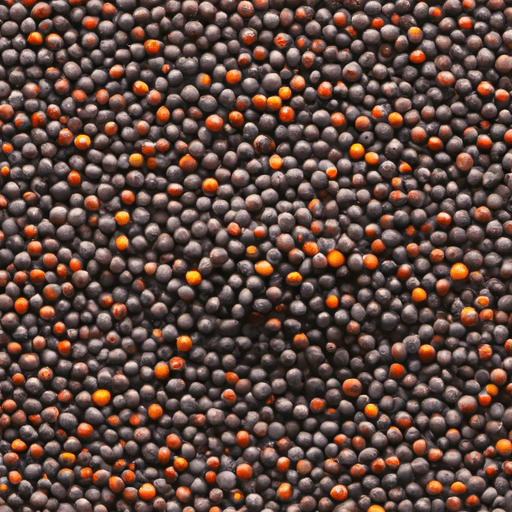The Versatile Black Mustard Seed: A Must-Have in Your Kitchen
When it comes to spices that add depth and complexity to your dishes, few can rival the humble black mustard seed. These tiny seeds pack a punch of flavor and have a long history in diverse culinary traditions around the globe. From Indian curries to traditional German cuisine, black mustard seeds have earned their place in kitchens worldwide. In this article, we’ll explore the taste, common uses, nutritional value, and interesting facts about this remarkable spice.
Taste and Aroma
Black mustard seeds boast a unique combination of pungency and nuttiness that sets them apart from their yellow and white counterparts. When crushed or heated, they release a distinct aroma with hints of pepper and a subtle earthiness. The flavor profile of black mustard seeds can be described as sharp, spicy, and slightly bitter, intensifying when they are toasted or fried. Despite their strong taste, they add a depth of flavor that enhances the overall profile of a dish without overpowering it.
Common Uses in Cooking
The culinary uses of black mustard seeds are as diverse as the cultures that embrace them. In Indian cuisine, they are a cornerstone of many spice blends, such as curry powder and garam masala. The seeds are often tempered in hot oil at the beginning of a recipe, releasing their flavorful compounds and infusing the base of the dish. Their presence in Indian pickles and chutneys adds a delightful tang and texture.
Additionally, black mustard seeds make an appearance in German cuisine. They are a crucial ingredient in traditional mustard recipes, offering a more intense and complex flavor compared to yellow mustard. These seeds are also commonly used in the preparation of sauerkraut and various marinades.
Outside of these culinary traditions, black mustard seeds can be used in a variety of dishes. They add a unique touch to salad dressings, roasted vegetables, and stir-fries. Furthermore, they can be ground into a powder and incorporated into spice rubs for meats or used as a crust for fish. The versatility of black mustard seeds is limited only by your culinary experimentation.
Nutritional Value
Apart from being a flavor powerhouse, black mustard seeds bring several health benefits to the table. They are packed with nutrients and phytochemicals that contribute to overall well-being. Here are some notable nutritional highlights of black mustard seeds:
Rich in Antioxidants: Black mustard seeds are a good source of antioxidants, which help protect cells from damage caused by free radicals.
Excellent Source of Minerals: These seeds are particularly high in minerals such as selenium, magnesium, calcium, and iron, all of which play vital roles in maintaining optimal health.
Fiber and Digestive Health: Black mustard seeds are rich in dietary fiber, aiding digestion and promoting bowel regularity.
Vitamin-Rich: They also contain beneficial vitamins, including vitamin A, vitamin C, and various B vitamins that support overall health and wellbeing.
Interesting History and Facts
Black mustard seeds have a fascinating history that spans thousands of years. Originating in the Mediterranean region, these seeds were cultivated by the ancient Romans, Greeks, and Egyptians. They were highly valued for both culinary and medicinal purposes. It is said that the ancient Greek physician Hippocrates used mustard seeds in his remedies.
Moreover, black mustard seeds have a significant place in traditional medicine systems like Ayurveda and traditional Chinese medicine, where they are believed to possess various healing properties, including anti-inflammatory and digestive benefits.
Intriguingly, it is the enzyme in black mustard seeds, myrosinase, that contributes to their pungency. This enzyme is activated when the seeds are crushed or ground, releasing the sharp and spicy compounds that lend them their distinctive flavor.
From their remarkable taste and aroma to their diverse culinary uses and health benefits, black mustard seeds are an essential ingredient that every home cook should have in their pantry. These small yet mighty seeds provide a delightful combination of heat, nuttiness, and bitterness that elevates dishes from ordinary to extraordinary. So, next time you’re looking to add a unique touch to your favorite recipes, consider reaching for the ever-versatile black mustard seed.
Black Mustard Seed
Origin: Black mustard seeds (scientific name: Brassica nigra) are native to the Mediterranean region. They have been cultivated for thousands of years and were widely used in ancient Rome and Greece.
Common Uses: Black mustard seeds are commonly used as a spice in various cuisines around the world. They have a strong, pungent, and slightly bitter flavor. They are typically used in pickling, curry pastes, spice blends, sausages, and marinades. In Indian cuisine, they are frequently found in dishes like dal, curries, and chutneys.
Nutritional Benefits: Black mustard seeds are a good source of nutrients. They are rich in protein, fiber, and essential minerals such as calcium, iron, and selenium. They also contain phytonutrients, including various antioxidants and anti-inflammatory compounds.
Unique Properties: When the seeds are crushed or ground and mixed with liquid, they release a sulfur compound called allyl isothiocyanate. This compound gives black mustard seeds their characteristic pungent taste and distinctive aroma. The seeds also contain a small amount of essential oil, which contributes to their flavor.
Historical Significance: Mustard seeds have a long history of culinary and medicinal uses. They were highly valued in ancient civilizations for their therapeutic properties. They were used as a remedy for various ailments, including digestive issues, chest congestion, and muscular aches. Mustard seeds were also mentioned in ancient texts, such as the Bible and ancient Egyptian papyri, where they were praised for their healing properties.




Use the share button below if you liked it.
It makes me smile, when I see it.